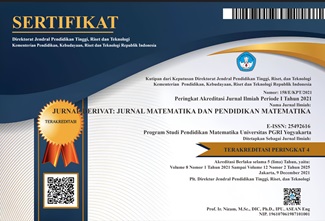Penerapan Model Pembelajaran Kooperatif Tipe Tps Terhadap Kemampuan Pemecahan Masalah Matematis Siswa
DOI:
https://doi.org/10.31316/j.derivat.v6i2.503Abstract
AbstractTeachers were required to create an active learning environment that could grow the students’ learning spirit and mathematical thinking. The cooperative learning model type TPS could provide opportunities for students to be more active and creative in solving mathematical problems. This research was a quasi-experimental study (t-test) with the nonequivalent control group design. The research was conducted to find out: (1) that students’ mathematical problem solving abilities that obtained cooperative learning type TPS were better than students who obtained direct instruction, (2) that students' mathematical problem solving abilities obtained the cooperative learning model type TPS achieve the KKM. The research population were all seventh grade students of SMP Negeri 1 Tulis. Sampling was done by cluster random sampling technique. The method of data collection in this research was a test of mathematical problem solving abilities. The data of the research results were processed using prerequisite tests, average difference test and completeness test. The results showed that: (1) students’ mathematical problem solving abilities that obtained cooperative learning type TPS were better than students who obtained direct instruction, (2) the value of students with the value of problem solving skills  70 that obtained the cooperative learning type TPS more than 75%.Â
Keywords: Implementation, TPS, Mathematical Problem Solving Ability.
AbstractTeachers were required to create an active learning environment that could grow the students’ learning spirit and mathematical thinking. The cooperative learning model type TPS could provide opportunities for students to be more active and creative in solving mathematical problems. This research was a quasi-experimental study (t-test) with the nonequivalent control group design. The research was conducted to find out: (1) that students’ mathematical problem solving abilities that obtained cooperative learning type TPS were better than students who obtained direct instruction, (2) that students' mathematical problem solving abilities obtained the cooperative learning model type TPS achieve the KKM. The research population were all seventh grade students of SMP Negeri 1 Tulis. Sampling was done by cluster random sampling technique. The method of data collection in this research was a test of mathematical problem solving abilities. The data of the research results were processed using prerequisite tests, average difference test and completeness test. The results showed that: (1) students’ mathematical problem solving abilities that obtained cooperative learning type TPS were better than students who obtained direct instruction, (2) the value of students with the value of problem solving skills  70 that obtained the cooperative learning type TPS more than 75%.ÂKeywords: Implementation, TPS, Mathematical Problem Solving Ability.
Downloads
Published
20-12-2019
Issue
Section
Articles
Citation Check
License
Authors who publish with this journal agree to the following terms:
-
Authors retain copyright and grant the journal right of first publication with the work simultaneously licensed under a Creative Commons Attribution-ShareAlike 4.0 International License that allows others to share the work with an acknowledgment of the work's authorship and initial publication in this journal.
- Authors are able to enter into separate, additional contractual arrangements for the non-exclusive distribution of the journal's published version of the work (e.g., post it to an institutional repository or publish it in a book), with an acknowledgment of its initial publication in this journal.
- Authors are permitted and encouraged to post their work online (e.g., in institutional repositories or on their website) prior to and during the submission process, as it can lead to productive exchanges, as well as earlier and greater citation of published work (See The Effect of Open Access).







